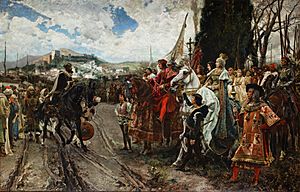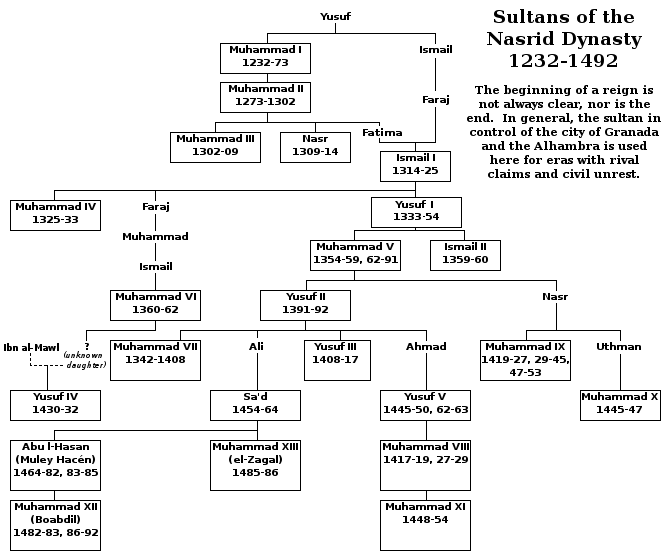Nasrid facts for kids
The Nasrid dynasty (also called Banuu Nasri) was the very last Arab and Muslim ruling family in Spain. A dynasty is a series of rulers from the same family.
The Nasrids became powerful after another dynasty, the Almohads, were defeated in 1212 at the Battle of Las Navas de Tolosa. The Nasrid dynasty was founded in 1232 by Muhammed I ibn Nasr. Twenty-three different rulers, called emirs or sultans, governed the city of Granada during their time.
Their rule ended on January 2, 1492. On this day, Muhammad XII of Granada surrendered to the Christian kingdoms of Aragon and Castile. Today, the most famous thing left by the Nasrids is the amazing Alhambra palace. They built this beautiful palace during their rule.
Who Were the Nasrid Rulers?
- Muhammed I ibn Nasr (1238-1272)
- Muhammed II al-Faqih (1273-1302)
- Muhammed III (1302-1309)
- Nasr (1309-1314)
- Ismail I (1314-1325)
- Muhammed IV (1325-1333)
- Yusuf I (1333-1354)
- Muhammed V (1354-1359, 1362-1391)
- Ismail II (1359-1360)
- Muhammed VI (1360-1362)
- Yusuf II (1391-1392)
- Muhammed VII (1392-1408)
- Yusuf III (1408-1417)
- Muhammed VIII (1417-1419, 1427-1429)
- Muhammed IX (1419-1427, 1430-1431, 1432-1445, 1448-1453)
- Yusuf IV (1431-1432)
- Yusuf V (1445-1446, 1462)
- Muhammed X (1446-1448)
- Muhammed XI (1453-1454)
- Said (1454-1464)
- Abu l-Hasan Ali, known as Muley Hacén (1464-1482, 1483-1485)
- Abu 'abd Allah Muhammed XII, known as Boabdil (1482-1483, 1486-1492)
- Abū `Abd Allāh Muhammed XIII, known as El Zagal (1485-1486)
Nasrid Family Tree
Related Topics
- William Montgomery Watt: A History of Islamic Spain, Edinburgh University Press, 1965 ISBN: 0-7486-0847-8
Images for kids
-
The coat of arms of the Emirate of Granada, found on a wall in the Alhambra.
See also
 In Spanish: Nazarí para niños
In Spanish: Nazarí para niños
 | John T. Biggers |
 | Thomas Blackshear |
 | Mark Bradford |
 | Beverly Buchanan |







